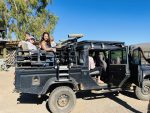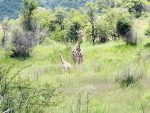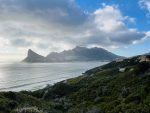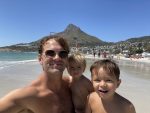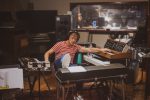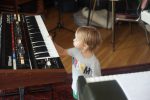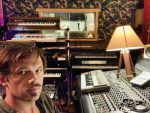Guest Column: Jean-Philip Grobler on the distance covered on St. Lucia EP ‘Utopia I’

Patti Beranek and Jean-Philip Grobler of St. Lucia photographed in South Africa in February 2022. Courtesy Gabrielle Kannemeyer. All other photos courtesy of Jean-Philip Grobler.
Editor’s note: Friend of RIFF Jean-Philip Grobler, of newly indie band St. Lucia, has been chronicling his and his wife and bandmate Patti Beranek’s travels from New York to Germany on social media for several years. Along with their two young kids, they left Brooklyn and moved to Beranek’s hometown in Germany to be closer to her family. Grobler, from South Africa, went years without seeing his own family. He took on the challenge of connecting how the family’s isolation and moves during the pandemic led them to the new St. Lucia EP, Utopia I.
Utopia I
St. Lucia
Nettwerk, April 29
It was March 12, 2020, and my mom was booked on a flight from Johannesburg, South Africa to come visit us in NYC on the 15th. By that point, I already hadn’t seen my family for around a year. We’d also just returned from a show in Tampa, Florida, and I was starting to feel a little under the weather. There were loud rumblings about some virus beginning to circle the globe. The day before my mom was supposed to fly to New York, we decided to cancel her flight because at this point, it was clear that I had something “unusual” going on with my body. Patti was coming down with something, too. There was no testing yet, but we assumed that we were some of the first in New York to come down with the dreaded virus because we had all the telltale symptoms.
And, of course, the rest is history.
Over the next couple of years, we decided to leave New York and move to Germany to be closer to Patti’s family. We had another baby, Charlie, and made a ton of new music. In between all this, we lived in upstate New York for a while and more or less ran out of money from funding our new record all by ourselves and not being able to play any shows.
I took to swimming in a freezing lake—sometimes chipping through the ice to get in—to alleviate the stress of having a 3-year-old and a newborn with no family or friends around to support us. Then, finally, at the beginning of February 2021, we flew to Zürich and crossed the border to Konstanz, Germany, which is Patti’s childhood hometown.
At this point, we’d already completed far more than an album’s worth of material and were starting to shop it around to new labels. Our contract with Columbia Records had ended in 2019. We felt good about already having this body of work, but having time to write and record more put us in a really good creative space. When our gear arrived from the U.S., we already had a few ideas in the bank and started recording at what felt like a feverish pace. We were feeling refreshed by being in new surroundings and close to family. Patti’s mom’s delicious Taiwanese cooking and her family’s warmth was a stark contrast to the isolation we felt during the pandemic in NYC. We also felt that the worst of the pandemic was behind us, and after the hardships of the year before, we felt a glimmer of light starting to shine through.
We began to feel that the world needed something bright and positive, but not in a way that felt corny or unearned. To me, there always needs to be a balance between the darker and lighter aspects of my music in order for a song to be a contender. I always have my senses attuned to this idea when I’m working, whether I’m aware of it or not. One song may be brighter or happier than another, but there needs to feel like there is a balance on a record on the whole. It’s funny to me that we’ve become known as this sort of positive force in music over the years, because it’s certainly not by design. I suppose, if anything, our desire is to create something inspirational and feels like the musical equivalent of life itself, as hubristic as this sounds.
It was in this spirit of making something positive that we began to work on what would become Utopia I, even though we didn’t know it at the time. We thought we were just having fun and writing a few more songs, but something about the ease and lack of pressure we felt brought out these songs that felt extremely immediate. First it was “Rocket On My Feet,” then “Another Lifetime” and then “The Golden Age.” Bang, bang, bang. We were using simple beats, and not shying away from showing who our influences are. It was just pure enjoyment and inspiration, which felt cathartic to us—like we’d been wandering through a desert only to happen upon an oasis surrounded by unicorns beneath a triple rainbow. The themes of all three of these songs also seem connected: how to find inner peace in a world gone mad.

My loves. Can you tell I’m obsessed with turquoise? At Mission Sound in Brooklyn in 2019 during initial recording sessions for our new music, none of which is on the current record, but it was part of the process.
The other two songs on the EP come from a slightly different time, but I think it helps create the overall balance I’m seeking. “Separate World” was inspired by a [Krautrock band] Neu! song that I could barely hear in a Mexican restaurant called Guadalupe Inn, which was just around the corner from my Brooklyn studio. It more directly deals with my frustration around media misinformation and our divided society. “Memory” was written—about a month after Charlie was born—at the home of Nini [Fabi] and Benny [Gebert] (of Haerts) in upstate New York. It was a magical but crazy and isolated time, and the only time I would find to work was—maybe—an hour or two in the evenings.
One night, I went up to the little studio cabin in the woods with Charlie on me in a baby carrier, and I sketched out the idea for “Memory.” The final version on the EP is 90 percent what I created that night, including the vocals. In fact, the vocals are still my gibberish lyrics from the scratch vocal I laid down while Charlie was sleeping on me and I was trying to be as quiet as possible.
Utopia I also marks our reunification with Chris Zane, who mixed part of debut album When the Night and co-produced and mixed Matter with me. We’d been working with Peter Katis on mixing a lot of the other music we had up until that point, but something about this new world we created seemed to speak to Chris’ sensibilities, so it was a no-brainer. Over the rest of the summer we were finishing up Utopia I. It all came together pretty quickly and fairly easily, but it was built on a bed of material that was far more difficult to conjure.
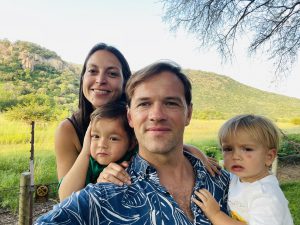
Enjoying some family time and watching rhinos pass by in front of our chalet at Kwa Maritane, in Pilanesberg National Park, about two hours away from Johannesburg.
Despite having this new body of work complete, and being reunited with Patti’s family and Chris Zane, I still had a hole in my heart the shape of my family. By the time the EP was done, we hadn’t seen each other for almost two and a half years.
Over the next few months, we had COVID a second time, got Utopia I mastered, I’d traveled back to the U.S. a few times for DJ sets, and we cautiously watched how travel restrictions were playing out around the globe. When we got to mid-December, and it seemed like the airways between Zürich and Johannesburg were still open and holding, we booked our tickets for a five-week trip in January.
One of my favorite things about South Africa in summertime—December to February—is the way it smells. I remember arriving back from a frigid NYC winter a few years ago and feeling like I’d walked into a flower shop. Unfortunately, my second round of COVID left me with far less of a sense of smell than I used to have, but it still felt like arriving on Pandora.
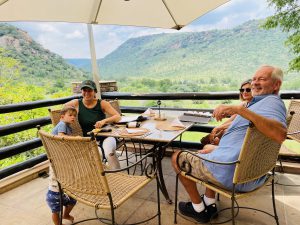
Having just arrived at Kwa Maritane Lodge in Pilanesberg National Park, we sat down to have lunch and enjoy the beautiful view.
My son Indy hadn’t seen his granny and grandpa since he was 1 and a half, and Charlie had never met them, so to say it was emotional would
be an understatement. For some reason, every time I go back I always expect Johannesburg to be in a worse state than when I was last there. Maybe it’s the way international news depicts Africa. Maybe it’s listening to friends and family complain about corrupt politicians over Facetime. But somehow, every time I go back, it feels even more alive than when I left.
What’s interesting to me about South Africa is how it seems, in many ways, ahead of the rest of the world, despite it always being portrayed as being behind. It’s true that a lot of the politics are corrupt, but as we’ve learned over the last few years, where are they not? And what I admire about people living in South Africa, and in other parts of Africa, is how many of them have learned that in order to solve their problems, they can’t rely on their governments. They need to rely on themselves. For years now, South Africans have suffered because of lack of investment in basic infrastructure, while politicians walk around with pockets sewn with golden thread.
The ever-present scheduled blackouts have become both a boon for comedy and the reason for a whole industry of home-power solutions like solar panels and generators. After living in many of the wealthy economies of the Western world for almost 20 years now, it’s refreshing for me to go back to the land of my birth and to see people thriving despite the difficulties placed in their paths. While it’s true that too often in these situations it’s the least fortunate who suffer the most, I had many conversations that I found reassuring. Meanwhile, it seems like many people in the West want their governments to take care of them and cede more and more control to massive centralized power structures every year without any thought that maybe, one day, that government will fail or turn on them.
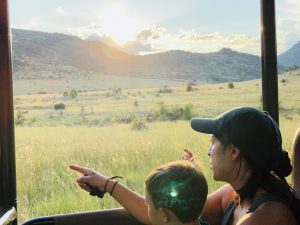
Patti and our older son, Indy, in our safari vehicle looking out at the incredible landscape as the sun sets over Pilanesburg National Park. We were wary of taking the kids out on a three-hour safari but they loved it and were basically totally transfixed the whole time.
Every time I go back to South Africa I become more of a believer in decentralization of power, and the ability of individual citizens to have agency over their own lives. This seems to have happened somewhat by accident in South Africa, where the government isn’t wealthy or powerful enough to stamp down on its citizens. The power of the people is very much alive and well. A funny example of this is that a few years ago, the government tried to create a system of E-Tolls for the freeways. They built huge, spider-like structures equipped with cameras and all sorts of hi-tech apparatus that would scan cars and charge the the toll. Over the next few years, there was a citizens’ revolt, in slow motion. Gradually, people either didn’t pay their bills or just didn’t carry the device with them. Now these huge structures stand completely unused and more or less abandoned.
South Africa has a healthy private bus industry, simply called “taxi” industry, which is more like a paid rideshare that mainly serves the lower rungs of the
economic ladder. I used to often take these taxis to visit my girlfriend at a school in Pretoria. It was a cheap and fun ride with great music despite the floor of the minivan usually being partially missing. This taxi industry, as well as various citizens’ action programs, were the main drivers of the rebellion against the state.
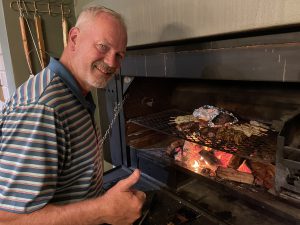
My dad, Philip, looking very excited about the indoor braai (Afrikaans word for barbecue) possibilities at the house we stayed at in the Karoo, an arid region in southern South Africa.
All of this is just to say that it felt really good to go back to South Africa from a sociological perspective, as well as just being reunited with my family somewhere beautiful. It gave me faith that we can fix the problems of this planet, but it’s not up to governments or NGOs to do it. It’s up to individual people and the power we have to protest and vote with our pockets.
I could bore you with the details of our trip, but it’s the same story you’ve heard a million times before. We spent some time with my family in Johannesburg, took the kids on safari and went to Cape Town for a couple weeks, where we went to the wine lands, spent time at the beach and tried to expose the kids to as much culture as possible without being overbearing. It was truly wonderful being back at home and reconnecting with my roots, and I felt I had a renewed sense of purpose returning to Germany in February.
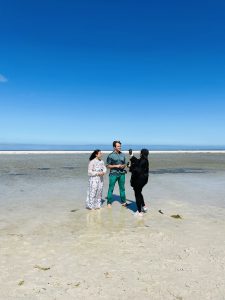
Taking photos on Noordhoek Beach, close to Cape Town, with the lovely and extremely talented South African photographer Gabrielle Kannemeyer.
Some food for thought: Why did we call our new body of work Utopia? It’s generally the exact opposite of what it describes, and I love things that both describe something and contradict themselves at the same time. Almost all examples of people trying to create utopias in history turned out to be disastrous. We are constantly torn between two extremes as human beings, rooted in the uneasy balance between our individuality and the fact that we’re part of a larger beehive.
For a healthy society to flourish, we need both aspects of our humanity to be served and in balance. Too strong of a government that’s constantly telling society what it has to do and what they don’t want us to do is a recipe for revolt, just as the opposite extreme also leads to bad outcomes. So maybe, the real utopia we’re looking for exists in the balance between things being the way we want them to be and the way people we disagree with want them to be.
When no one opinion can steamroll another, even if we think that opinion is wrong, that’s what allows us to be human and create positive change in society. We need to be able to be wrong, or else we wouldn’t be able to fight against things like E-Tolls imposed upon us by a government with which we disagree.
I was happy to find South Africa alive, well and living in this uneasy state of balance. Life is a bit like a tightrope, but I wouldn’t rather walk it any other way.
- Our safari vehicle when we went on safari a second time at Aquila National Park, about two hours outside of Cape Town.
- A mother giraffe and its calf.
- Some hippos we spotted toward the end of one of our evening safaris, or as we call them in South Africa, game drives.
- The view over Hout Bay on a run I took up Chapmans Peak Drive, just before I twisted my ankle and Patti had to come pick me up. We stayed in Hout Bay during our trip to Cape Town.
- Indy, our younger son, Charlie, and I on a beautiful day in Camps Bay.
- Our current setup in our apartment in Konstanz, Germany, where most of “Utopia I” was made.
- At Mission Sound in Brooklyn working on a bunch of projects, from initial recording for our new body of work, through DL is OK’s “Gravy Days” to some new music for the band Airpark.
- Indy in August 2019 at Mission sound, when we were working on DL is OK’s album “Gravy Days.”
- July 2020 in the heart of the pandemic in my Brooklyn Studio in Bushwick.


